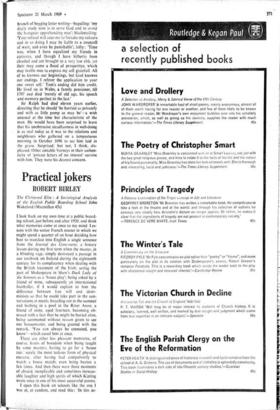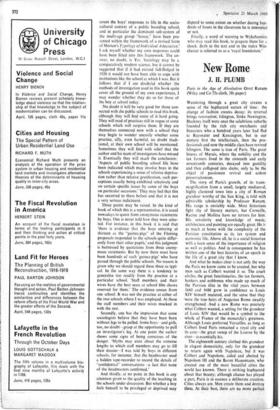Practical jokers
ROBERT BIRLEY
I look back on my own time at a public board- ing school, just before and after 1920, and think what memories come at once to my mind. Les- sons with the senior French master in which we might spend a quarter of an hour deciding how best to translate into English a single sentence from the Journal des Goncourts; a history lesson during my first term when the master,. in a blinding rage, simply destroyed a passage in our textbook on Ireland during the eighteenth century for its complacency when dealing with the British treatment of the Irish; acting the part of Shakespeare in Shaw's Dark Lady of the Sonnets as a 'house play'; being asked by a friend of mine, subsequently an international footballer, if I would explain to him the difference between free will and deter- minism so that he could take part in the con- versations at meals; bicycling out in the summer and bathing in a pool in the River Avon; a friend of mine, aged fourteen, becoming ob- sessed with a fear that he might be buried alive, being summoned without reason given to see our housemaster, and being greeted with the remark, 'You can always be cremated, you know'—which cured him at once.
There are other less pleasant memories, of course, hours of boredom when being taught by some masters; having to go for a 'house run,' surely the most tedious form of physical exercise, after having had compulsorily to watch a house match; even being beaten a few times. And then there were those moments of absurd, inexplicable and sometimes inexcus- able laughter and high spirits of which Kipling wrote once in one of his most successful poems.
I open this book on schools like the one I was at, at random, and read this: 'In this ac- count the boys' responses to life in the socio- cultural context of a public boarding school, and in particular the dominant sub-system of the multi-age group "house," have been pre- sented within the framework of a revised form of Merton's Typology of Individual Adaptation.'
I ask myself whether my own responses could have been fitted into this framework. The an- swer, no doubt, is Yes. Sociology may be a comparatively modern science, but it cannot be suggested that if it had existed full-fledged in 1920 it would not have been able to cope with institutions like the school at which I was. But it follows that if I am doubtful whether the methods of investigation used in this book quite cover all the ground of my own experiences, I may wonder whether they do so for those of the boy at school today.
No doubt it twill be very good for those con- nected with the public schools to read this book, although they will find some of it hard going. They will read of practices still in vogue at some schools which will surprise them. If they are themselves connected now with a school they may begin to wonder uneasily whether some practice, silly, even harmful, no doubt tradi- tional, at their own school will be mentioned. Sometimes they will find with relief that the author and his team of investigators have missed it. Eventually they will reach the conclusion : `Aspects of public boarding school life have been indicated which may involve boys in the schools experiencing a sense of relative depriva- tion rather than relative gratification, such per- ceptions usually being exhibited selectively and on certain specific issues by some of the boys on particular occasions.' They may feel that this has occurred to them before and that it is not a very serious indictment.
Three points may be raised. In the kind of book of which this is a representative, it is usual nowadays to quote from anonymous statements by boys. One is never told how they were selec- ted. For instance, in this book it is said that 'there is evidence that the boys entering at thirteen as the "guinea-pigs" of the Fleming proposals responded to the schools quite differ- ently from their other pupils,' and this judgment is buttressed by quotations from three anony- mous statements. But by now there must have been hundreds of such 'guinea-pigs' who have passed through the public schools. No reason is given why we should regard these three as typi- cal. In the same way there is a tendency to generalise too readily from the practice at a particular school. 'Staff members and their wives have the best seats at school film shows reserved for them,' The evidence comes from one school. h was not• the practice at either of the two schools where I was employed. At these the staff members and their wives mucked in with the rest.
Secondly, one has the impression that some sociologists believe that they have been born without legs to be pulled. Some boys—and girls, too,, no doubt—grasp at the opportunity to pull an investigator's leg. At one point the author shows some signs of being conscious of the danger. 'Myths may exist about the extreme lengths to which staff members may go to fill their dossier—I was told by boys in different schools, for instance, that the headmaster used a hidden tape-recorder to record the details of "confidential" conversations—a fact that none of the headmasters confirmed.'
And thirdly, at no point in this book is any attention given to the quality of the teaching in the schools under discussion. But whether a boy feels himself to be privileged or deprived may depend to some extent on whether during hun- dreds of hours in the classroom he is interested or not.
Finally, a word of warning to Wykehamists who may read this book, to prepare them for a shock. Both in the text and in the index Win- chester is referred to as a 'royal foundation.'











































 Previous page
Previous page